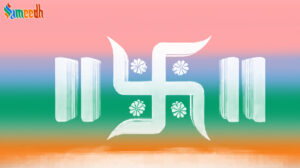The word “swastik” is derived from the Sanskrit word “svastika,” which means “conducive to well-being” or “auspicious.” The swastik is considered auspicious in Hinduism for several reasons, and its symbolism is deeply rooted in Hindu religious and cultural traditions.

In Hinduism, the swastik is often associated with the sun and represents the sun’s energy and life-giving power. It is also a symbol of the god Ganesh, who is revered as the remover of obstacles. Here are some of the key reasons why the swastik is regarded as an auspicious symbol in Hinduism:
- Ancient Symbol: The swastik is an ancient symbol with a history dating back thousands of years. It has been found in archaeological excavations in the Indian subcontinent and is believed to be one of the oldest symbols used by humans. Its longevity contributes to its significance.
- Representation of Cosmic Order: In Hindu cosmology, the swastik is often seen as a symbol representing the cosmic order (rita). The four arms of the swastik are associated with the four cardinal directions, symbolizing the orderly nature of the universe.
- Symbol of Sun and Light: The swastik is often associated with the sun, which is a symbol of life, light, and energy in Hinduism. The rotational movement of the swastik’s arms is sometimes linked to the sun’s daily journey across the sky, signifying the cyclical nature of time and life.
- Connection to Hindu Deities: The swastik is associated with Ganeshji. It is a common symbol in the iconography of Ganesh, the elephant-headed god of wisdom and remover of obstacles. The swastik is often found on Ganesh’s palm, symbolizing auspiciousness.
- Positive Energy and Good Fortune: The swastik is believed to radiate positive energy and is considered a symbol of good fortune and well-being. Drawing or displaying a swastik is thought to invite auspiciousness and blessings into a person’s life.
- Spiritual Significance: The swastik with four dots is associated with the four states of existence or the four goals of life, known as the “Purusharthas” in Hindu philosophy. The swastik is also connected to spiritual concepts in Hinduism. It symbolizes the pursuit of spiritual growth, righteousness (dharm), and the harmonious balance of various aspects of life.
- Cultural Tradition: The swastika has become deeply ingrained in Hindu culture and traditions. It is commonly used in religious ceremonies, festivals, and decorations. The practice of drawing a swastik before the commencement of rituals or events is a cultural tradition aimed at invoking positive energies.
It’s important to note that the positive connotations of the swastik in Hinduism are distinct from the negative associations it acquired in the 20th century due to its use by the Nazi regime. In Hinduism, the swastik remains a revered and auspicious symbol, symbolizing positive attributes and spiritual principles.